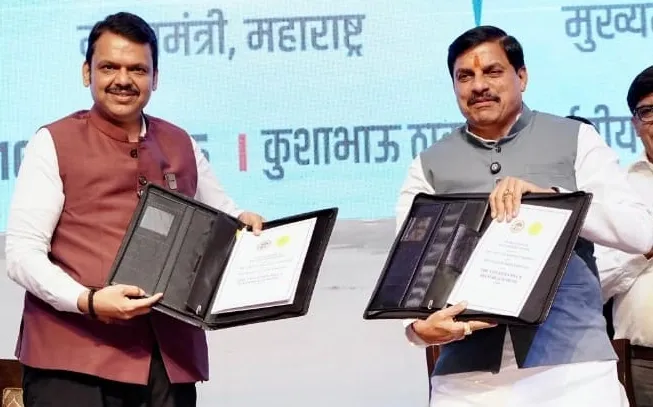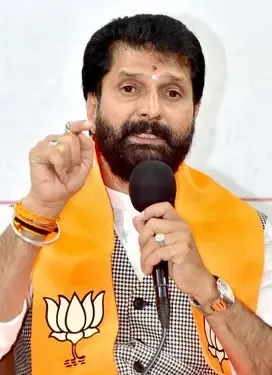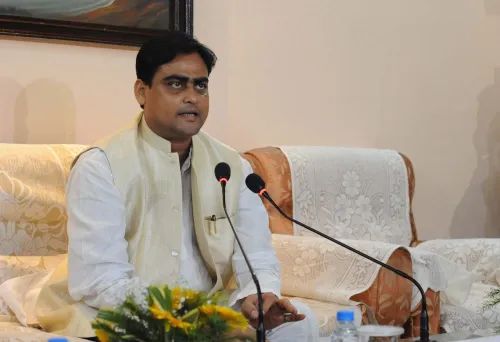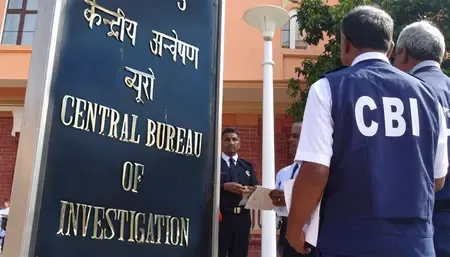Did MP and Maharashtra Sign a Pact for the Rs 19,244 Crore Tapti Basin Recharge Project?

Synopsis
Key Takeaways
- Tapti Basin Mega Recharge Project is the world's largest groundwater recharge initiative.
- The project aims to benefit both Madhya Pradesh and Maharashtra.
- It will enhance irrigation for over 3.65 lakh hectares.
- The project will not disturb any local villages.
- Key focus on sustainable water management and environmental conservation.
Bhopal, May 10 (NationPress) In a significant move towards enhancing inter-state river collaboration, the governments of Madhya Pradesh and Maharashtra have formalized an agreement for the ‘Tapti Basin Mega Recharge Project’, recognized as the largest groundwater recharge initiative globally. This project is designed to promote sustainable water management for both states.
On Saturday, Maharashtra Chief Minister Devendra Fadnavis and Madhya Pradesh Chief Minister Dr. Mohan Yadav signed the agreement in Bhopal.
Describing the partnership as historic, Chief Minister Fadnavis commended Prime Minister Narendra Modi for his pivotal role in advancing the project from concept to execution. “This deal, valued at approximately Rs 19,244 crore, is set to benefit the salt pan regions of Vidarbha and North Maharashtra,” he remarked.
Fadnavis emphasized the substantial advantages, with Madhya Pradesh poised to enhance irrigation for 1.31 lakh hectares while Maharashtra will gain irrigation access for 2.34 lakh hectares, particularly in saline areas.
Both leaders expressed their commitment to elevating this initiative to the national level, seeking the Central Government’s designation of it as a national scheme, similar to the Ken-Betwa river-linking project.
CM Yadav highlighted Madhya Pradesh's rich water resources, noting the importance of managing its 247 rivers effectively, despite the lack of glaciers.
Plans are underway to develop three streams of the Tapti River to optimize agricultural irrigation, ensuring maximum utilization of water reserves. The project aims to harness 31.13 TMC (Thousand Million Cubic Feet) of water, with Madhya Pradesh receiving 11.76 TMC and Maharashtra 19.36 TMC.
Importantly, the initiative will require 3,362 hectares of land without disrupting any villages, thus avoiding rehabilitation issues. Ensuring fair water distribution will be a priority as both states work to resolve existing water-sharing disputes. The governments are committed to advancing the Tapti and Kanhan river projects in a manner that balances environmental preservation, agricultural necessities, and industrial growth.
The newly developed irrigation infrastructure is expected to significantly enhance agricultural productivity in the Burhanpur and Khandwa districts. Additionally, the Chhindwara Complex Multipurpose Project aims to optimize water use within the Kanhan sub-basin, benefiting Chhindwara's agricultural lands while addressing the water needs of Nagpur, marking another milestone in interstate collaboration.
Madhya Pradesh's dedication to effective water management extends beyond this project, as it continues to work alongside Rajasthan and Uttar Pradesh on similar river-linking initiatives, according to Chief Minister Yadav. This initiative will create a permanent irrigation facility, providing benefits across thousands of hectares in both states, including crucial tehsils in Burhanpur and Khandwa districts.
Recently, Madhya Pradesh has commenced work on the Parvati-Kali Sindh-Chambal project in partnership with Rajasthan and is progressing with the Ken-Betwa river-linking project alongside Uttar Pradesh; now, similar efforts are underway with Maharashtra through the third National River Water Project.









